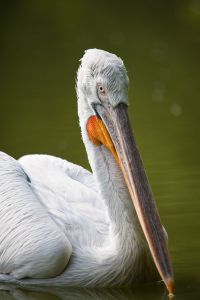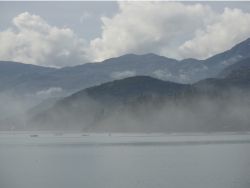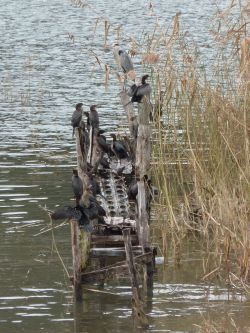Project of the Month: Dalmatian Pelicans and Wetlands of the Mediterranean Basin
 Bonn,
Bonn,
1 August 2013 - Wetlands are some of the world’s
most biologically diverse yet fragile ecosystems. They are
home to a remarkable number of waterbirds such as the Dalmatian
Pelican (Pelecanus crispus). In the Mediterranean
Basin, there are 226 Ramsar sites to date which are considered
as “Wetlands of International Importance”. In
addition, there are 196 other sites identified by BirdLife
International as matching the Ramsar Convention criteria.
These numbers demonstrate the importance of the Mediterranean
Basin for wetlands conservation.
Yet, Mediterranean wetlands provide essential
ecosystem services. However they are also particularly vulnerable
and damaged by regional threats, such as expanding agriculture,
and many are in a critical situation or have already disappeared.
This widespread degradation of Mediterranean
wetlands is also affecting the Dalmatian Pelican. This Pelican,
which is prominently featured on the CMS logo, is listed
on CMS Appendices I and II. It is also categorized as Vulnerable
by the IUCN, and listed under AEWA, Appendix II of the Bern
Convention, Appendix I of CITES, and Annex I of the European
Birds Directive.
 There
There
is a reason why this emblematic bird is protected by so
many multilateral environmental agreements: since the 17th
century, 80 per cent of its breeding sites have disappeared.
Today, its presence in Europe is limited to only 13 wetlands
of the Balkans and the Caucasus. Without continued conservation
efforts, the decline of breeding sites will eventually cause
the total disappearance of the Dalmatian pelicans from the
Mediterranean Basin.
With that in mind, the CMS Small Grants
Programme is funding a project on the conservation of Dalmatian
Pelicans and Wetlands in the Mediterranean Basin. The project
is being implemented by the French conservation organization
Noé Conservation, in partnership with Tour du Valat,
a research centre specializing in Mediterranean wetlands,
which will support the programme through scientific expertise
and knowledge. The Pelican Specialist Group which brings
together specialists representing the Species Survival Commission
of the IUCN and Wetlands International, together with the
Society for the Protection of Prespa, is giving further
support through a pool of experts. Other collaborating partners
include the National Park Skadar Lake in Montenegro, the
Centre for Protection and Research of Birds in Montenegro,
the Natural History Museum of Montenegro, the German foundation
EuroNatur, and the Association for Protection of Aquatic
Wildlife of Albania. Co-funding is being provided by the
Critical Ecosystem Partnership Fund, EuroNatur and Tour
du Valat.
 The
The
project focuses on the Skadar Lake National Park in Montenegro,
the single Montenegrin breeding site of the bird. The project
uses an innovative approach built on four key elements:
(i) improving the scientific knowledge on the species and
its environment, (ii) effective management of the breeding
site through the development of a site-specific action plan,
(iii) supporting sustainable management and use of natural
resources among local communities and (iv) establishing
a dialogue with policy makers and local communities to raise
awareness and encourage a more pelican friendly behaviour.
The outcomes of the project will then be communicated via
brochures, posters, an annual newsletter, cultural events
and on Noé Conservation’s website.
Peggy Poncelet, the manager of Noé
Conservation’s International Department,states: “Our
project follows a multi-goal strategy: the protection of
the Dalmatian Pelican as an umbrella species benefits other
wetland flora and fauna and the overall management of this
site. We also want to involve local communities and stakeholders
in the project to ensure a broader buy-in and long-term
sustainability of the project”. Peggy Poncelet further
explains that this approach contributes to sustainable local
economic development in line with the project’s conservation
goals.
Another important aspect of the project
is that it puts special emphasis on networking; in addition
to the partnership between the organizations involved, the
project is also integrated into another initiative of Noé
Conservation aiming to create a network of protected areas
for the conservation of Dalmatian Pelican and the management
of remarkable wetlands. This larger initiative creates networks,
for example, through exchange visits, a common Pelican database,
and shared management tools. It targets three protected
areas: Skadar Lake in Montenegro, Kerkini Lake in Greece
and Karavasta Lagoon in Albania.
Consequently, conservation efforts will
not stop at national borders - an approach in line with
the philosophy and mandate of CMS. To ensure the continuity
of conservation efforts in the long run, the project partners
are working to promote the revision or creation of National
Action Plans for the Dalmatian Pelican and site management
plans in both Montenegro and Albania.
Photographs courtesy of Gio'71/flickr.com
(Dalmatian Pelican) and Peggy Poncelet (Lake Skadar and
waterbirds)
THE PROJECT OF
THE MONTH
During the 2012 round
of the Small Grant Programme a total of 75 applications
was received and 12 projects were selected for funding.
In the coming months each of these projects will be featured
on the CMS website in a new “Project of the Month”
series that will show the activities that are taking place
within each project and the conservation impact on the species
concerned.
The Small Grant Programme
supports projects that are implemented on the ground with
a strong focus on the conservation of species listed in
the CMS Appendixes. It shows that CMS can really make a
difference when it comes to improving the status of the
species concerned working in close contact with the local
communities.
During the period 2012-2014
the Programme is being generously funded by UNEP.
Last updated on 16 June 2014


